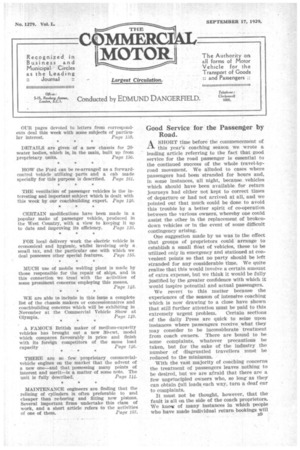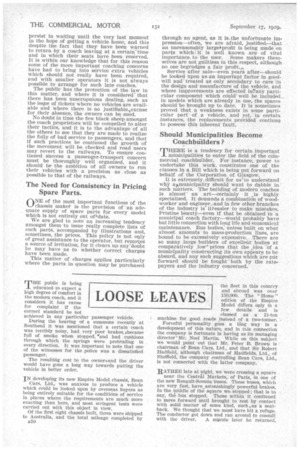Good Service for the Passenger by Road.
Page 43

Page 44

If you've noticed an error in this article please click here to report it so we can fix it.
A SHORT time before the commencement of this year's coaching season we wrote a leading article referring to the fact that good service for the road passenger is essential to the continued success of the whole travel-byroad movement. We alluded to cases where passengers had been stranded for hours and, in some instances, all night, because vehicles which should have been available for return journeys bad either not kept to correct times of departure or had not arrived at all, and we pointed out that much could be done to avoid this trouble by a better spirit of co-operation between the various owners, whereby one could assist the other in the replacement of brokendown vehicles or in the event of some difficult contingency arising.
One suggestion made by us was to the effect that groups of proprietors could arrange to establish a small flOat of vehicles, these to be utilized only in emergency and stationed at convenient points so that no party should be left stranded for any considerable time. We quite realize that this would involve a certain amount of extra expense, but we think it would be fully justified by the greater confidence with which it would inspire potential and actual passengers.
We revert to this matter because the experiences of the season of intensive coaching which is now drawing to a close have shown that still further attention must be paid to this extremely urgent problem. Certain sections of the daily Press are quick to seize upon instances where passengers receive what they may consider to be inconsiderate treatment from coach owners. There are bound to he some complaints, whatever precautions be taken, but for the sake of the industry the number of disgruntled travellers must be reduced to the minimum.
With the vast majority of coaching concerns the treatment of passengers leaves nothing to be desired, but we are afraid that there are a few unprincipled owners who, so longas they can obtain full loads each way, turn a deaf ear to complaints.
It must not be thought, however, that the fault is all on the side of the coach proprietors. We know of many instances in which people who have made individual return bookings will persist in waiting until the very last moment in the hope of getting a vehicle home, and this despite the fact that they have been warned to return by a coach leaving at a certain time and in which their seats have been reserved. It is within our knowledge that for this reason some of the more important coaching concerns have had to bring into service extra vehicles Which should not really have been required, Lind with smaller operators it is not always possible to arrange for such late coaches.
The public has the protection of the law in this matter, and where it is considered' that there has been unscrupulous dealing, such as the iskue of tickets where no vehicles are available and where there is no justitiable,excuse for their absence, the owners can be sued.
No doubt in time the few black sheep amongst the coach proprietors will be compelled to alter their tactics, and it is to the advantage of all the others to see that they are made to realize the folly of bad service to passengers, and that if such practices be continued the growth of the movement will be checked and road users may revert to the railways. To ensure continued success a passenger-transport concern must be thoroughly well organized, and it should be the ambition of all owners to run their vehicles with a precision as close as possible to that of the railways.




















































































































